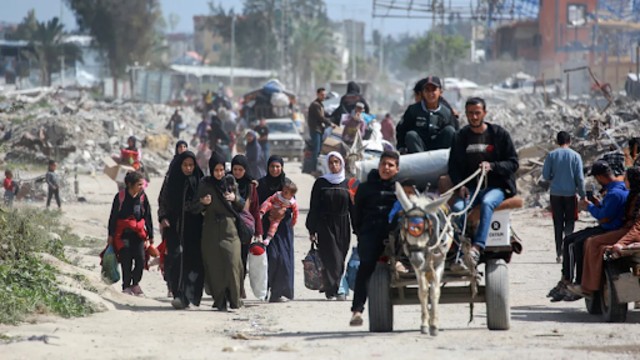
Palestinians leave Beit Hanun in northern Gaza, carrying their belongings, as they head to Gaza City after Israel issued evacuation orders on March 19. Getty Images
Israel’s security cabinet has approved a divisive proposal that would help Palestinians in Gaza emigrate to third countries. Critics argue that this could lead to ethnic cleansing, while Israel claims the Gaza emigration would be voluntary.
Defense Minister Israel Katz announced on Sunday that the cabinet agreed to create a system under the defense ministry to arrange the “safe and controlled” departure of Gazans. This includes setting up infrastructure, creating travel routes, and organizing pedestrian checks at designated crossings. The proposal follows US President Donald Trump’s plan, which envisions Gaza’s transformation into a developed area without its Palestinian residents.
The decision comes despite previous promises from Israel’s prime minister that there would be no permanent displacement of Gaza’s civilians. However, with the war making life in Gaza nearly impossible, many see this plan as a way to force Palestinians out.
Humanitarian groups have strongly criticized the move. The United Nations’ emergency relief head, Martin Griffiths, described Gaza as “uninhabitable,” with its people facing constant threats to their survival. Aid organizations argue that the ongoing war is pushing Palestinians to leave, making the so-called voluntary emigration questionable.
The new plan has drawn sharp criticism from Palestinian leaders. The Palestinian Authority’s Foreign Affairs Minister Varsen Aghabekian Shaheen firmly rejected the proposal, stating that Palestinians would not abandon their homeland.
Trump’s influence is clear in the Israeli government’s decision. Katz claimed that Israel is using "all means" to implement Trump’s vision. However, Trump recently softened his stance, saying that “nobody is expelling any Palestinians,” attempting to distance himself from earlier comments suggesting forced displacement.
US envoy Steve Witkoff also downplayed the emigration plan, describing it as a way to “shake up everyone’s thinking,” rather than an actual eviction scheme. Still, Israeli politicians have increasingly promoted mass Palestinian emigration as a solution to the war, bringing the once-extreme idea into mainstream political discussions.
The plan has also sparked outrage from Arab countries, especially Egypt and Jordan, who fear being pressured to accept large numbers of displaced Palestinians. Experts warn that such a move could destabilize the region and threaten neighboring countries' security.
Adding to the controversy, the security cabinet also approved expanding Jewish settlements in the occupied West Bank. Thirteen areas will be separated from existing settlements and recognized as independent ones. Israeli Finance Minister Bezalel Smotrich declared that the government is “raising the flag, building, and settling.”
Israeli settlement groups welcomed the decision, celebrating it as a step toward establishing Israeli sovereignty over the West Bank. However, rights organizations condemned it, saying it destroys any chance for future peace.
Smotrich and other right-wing ministers have been pushing for more settlements, despite international opposition. Expanding settlements is widely seen as a violation of international law and a direct challenge to UN resolutions.















